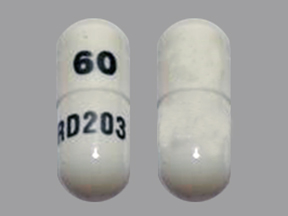
Propranolol ER Coupons & Savings Card – Discount Prices from $25.32
Generic for: Inderal la
My prescription
Edit
60MG, Propranolol ER (90 Capsule Extended Release 24 Hours)
Select pharmacy

CVS
$33.57
COUPON PRICE
Walmart
$25.32
COUPON PRICE
Albertsons
$31.02
COUPON PRICE
Walgreens
$35.19
COUPON PRICEPropranolol ER savings card
Show this card to your pharmacist
Walmart
$25.32
BIN
ID
PCN
GRP
019876
LHF4AFC252
CHIPPO
LHX
Powered by
More prescriptions for migraine
More prescriptions for migraine
Price history for Inderal La (brand) & Propranolol ER (generic)
90 Capsule Extended Release 24 Hours, 60MG
Average retail price for Inderal La
Average retail price for Propranolol ER
Average SaveHealth price for Propranolol ER
Our price history data is based on aggregated prescription data collected from participating pharmacies in America. Our prescription data updates daily to reflect the latest price changes. If you notice a missing data point, it means there wasn't sufficient data available to generate a monetary value for that date.
We analyzed Propranolol ER prices for (60MG, 90 Capsule Extended Release 24 Hours) over the last 12 months. The average retail price was $122.14, while the average price using the SaveHealth discount card was $23.16. That's a savings of approximately 81.04% when using our Propranolol ER coupon.
Compared to the generic version, Inderal La had an average price of $6852.34 over the same time period. With the SaveHealth savings card, Propranolol ER is 99.66% cheaper on average than Inderal La.
*Retail prices are based on pharmacy claims data, and may not be accurate when we don't have enough claims.
Propranolol ER dosage forms
Dosage Quantity Price from Per unit 60MG 90 Capsule Extended Release 24 Hours $25.32 $0.28 60MG 1 Capsule Extended Release 24 Hour $2.68 $2.68 60MG 30 Capsule Extended Release 24 Hours $7.94 $0.27 60MG 100 Capsule Extended Release 24 Hours $27.13 $0.27 60MG 500 Capsule Extended Release 24 Hours $80.20 $0.16 60MG 1000 Capsule Extended Release 24 Hours $134.10 $0.13 80MG 1 Capsule Extended Release 24 Hour $2.71 $2.71 80MG 30 Capsule Extended Release 24 Hours $8.82 $0.29 80MG 90 Capsule Extended Release 24 Hours $27.97 $0.31 80MG 100 Capsule Extended Release 24 Hours $30.08 $0.30
| Dosage | Quantity | Price from | Per unit |
|---|---|---|---|
| 60MG | 90 Capsule Extended Release 24 Hours | $25.32 | $0.28 |
| 60MG | 1 Capsule Extended Release 24 Hour | $2.68 | $2.68 |
| 60MG | 30 Capsule Extended Release 24 Hours | $7.94 | $0.27 |
| 60MG | 100 Capsule Extended Release 24 Hours | $27.13 | $0.27 |
| 60MG | 500 Capsule Extended Release 24 Hours | $80.20 | $0.16 |
| 60MG | 1000 Capsule Extended Release 24 Hours | $134.10 | $0.13 |
| 80MG | 1 Capsule Extended Release 24 Hour | $2.71 | $2.71 |
| 80MG | 30 Capsule Extended Release 24 Hours | $8.82 | $0.29 |
| 80MG | 90 Capsule Extended Release 24 Hours | $27.97 | $0.31 |
| 80MG | 100 Capsule Extended Release 24 Hours | $30.08 | $0.30 |
| 80MG | 500 Capsule Extended Release 24 Hours | $88.45 | $0.18 |
| 80MG | 1000 Capsule Extended Release 24 Hours | $150.60 | $0.15 |
| 120MG | 30 Capsule Extended Release 24 Hours | $8.82 | $0.29 |
| 120MG | 90 Capsule Extended Release 24 Hours | $27.97 | $0.31 |
| 120MG | 100 Capsule Extended Release 24 Hours | $30.08 | $0.30 |
| 120MG | 500 Capsule Extended Release 24 Hours | $106.20 | $0.21 |
| 120MG | 1000 Capsule Extended Release 24 Hours | $186.10 | $0.19 |
| 160MG | 90 Capsule Extended Release 24 Hours | $42.49 | $0.47 |
| 160MG | 100 Capsule Extended Release 24 Hours | $46.21 | $0.46 |
| 160MG | 500 Capsule Extended Release 24 Hours | $129.70 | $0.26 |
| 160MG | 1000 Capsule Extended Release 24 Hours | $233.10 | $0.23 |
